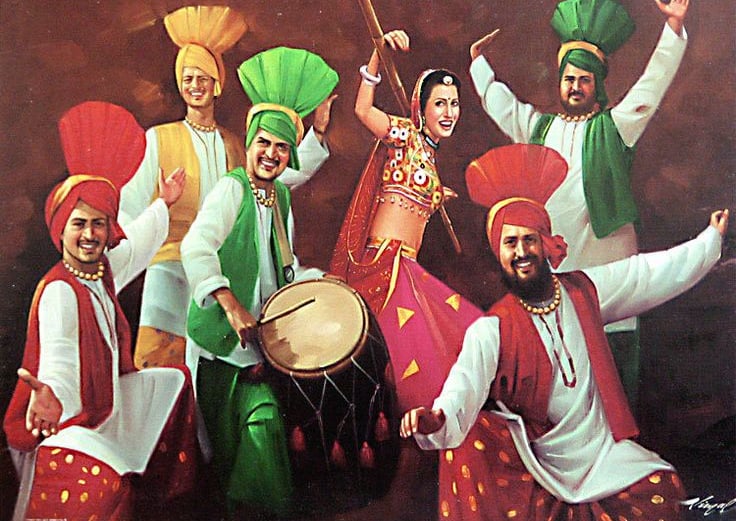Punjabi & Sufi Folk Music: Icons of Tradition and Spiritual Expression
Indian Folk Artist Part 2
Gajanan L. Bhonde
8/5/20258 min read


Pammi Bai – The Guardian of Traditional Bhangra
Pammi Bai, a prominent figure in the realm of Punjabi music, has earned recognition as a guardian of traditional Bhangra. Born into a family rich in cultural heritage, she developed a deep appreciation for the vibrant rhythms and spirited dance associated with Bhangra from an early age. Her unique musical journey began with a pure passion for preserving the authentic essence of this folk art form, which has captivated audiences worldwide.
Throughout her illustrious career, Pammi Bai has focused on maintaining the authenticity of Bhangra music, setting a benchmark for aspiring artists. By integrating traditional instruments and folk melodies, she has refrained from diluting the genre's rich cultural roots, ensuring that every note resonates with the essence of Punjabi traditions. Her distinctive style is marked by lively beats and melodic tunes that evoke a sense of nostalgia, deeply connecting listeners to the cultural fabric of Punjab.
One of Pammi Bai’s significant contributions to Bhangra music is her ability to adapt traditional sounds to contemporary platforms, fostering global recognition of this vibrant art form. She has performed at numerous prestigious events, captivating audiences with her colorful performances that showcase not just her singing prowess but also her deep-seated knowledge of Bhangra's history and significance. Her cherished collaborations with other artists further amplify the appeal of traditional music, bridging the gap between generations.
Key milestones in her career include her participation in various international festivals and music awards, where her performances have received acclaim. Pammi Bai's dedication to promoting Bhangra extends beyond her music; she actively engages in educational initiatives aimed at inspiring young artists to embrace and preserve Punjabi culture. Through her unwavering commitment and passion, Pammi Bai solidifies her role not just as a musician, but as a cultural ambassador of traditional Bhangra.
Nooran Sisters – Sufi Folk Voices that Transcend Borders
The Nooran Sisters, comprising Jyoti and Sultana, have emerged as influential figures in the realm of Sufi folk music, captivating audiences not only in their native Punjab but also across various cultural landscapes. Their ascent to fame is primarily attributed to their unique blend of traditional Sufi music with contemporary elements, allowing them to bridge the gap between generations while preserving the essence of their rich heritage. Their melodious voices and spirited performances resonate deeply, emphasizing the universality inherent in Sufi themes of love, spirituality, and devotion.
Their repertoire features iconic songs that reflect the spiritual depth and profound emotionality characteristic of Sufi folk music. One of their most acclaimed tracks is "Allah Hoo," which epitomizes their ability to evoke a transcendental experience through music. The emotive lyrics resonate with listeners, drawing them into a spiritual journey that transcends linguistic and cultural boundaries. The Nooran Sisters’ performances are renowned for their vibrant energy and interactive nature, often engaging the audience in a shared experience of devotion and celebration.
Lyrically, their songs often delve into themes of divine love, the quest for enlightenment, and personal narratives that reflect their own journeys. This personal touch not only enhances the relatability of their artistry but also reinforces the idea of music as a tool for spiritual expression. By interpreting timeless Sufi poetry and infusing it with their contemporary style, the Nooran Sisters continue to honor a tradition that has long been a cornerstone of Punjabi culture. Their impact is evident in the way they inspire both admiration and deep reflection, making them remarkable ambassadors for Sufi folk music on a global stage.
Kanwar Grewal – Contemporary Sufi-Folk with Depth
Kanwar Grewal has emerged as a significant figure in the realm of contemporary Sufi-folk music, captivating audiences with his unique blend of traditional melodies and modern influences. Renowned for his evocative voice and profound lyrics, Grewal’s work transcends generations, effortlessly bridging the gap between the rich cultural heritage of Punjabi folk and the dynamic landscape of today’s music scene.
His artistic journey reflects a deep appreciation for the spiritual roots of Sufi music while simultaneously incorporating contemporary themes that resonate with modern listeners. Grewal’s innovative approach is marked by the integration of various musical genres, including pop and rock, which not only enriches his sound but also broadens his appeal. This fusion creates a compelling auditory experience that invites both the young and old to connect with the underlying messages of love, spirituality, and social justice that are central to Sufi philosophy.
A close examination of Kanwar Grewal’s discography reveals several impactful works that showcase his lyrical depth and versatility. Songs like "Sufi Sufi" and "Ik Daaa Pyaar" illustrate his ability to address contemporary social issues while drawing from the timeless themes found in traditional Sufi poetry. Through his lyrics, Grewal invites listeners to reflect on universal human experiences, challenging the audience to engage with their own spirituality and emotions. His music often highlights the importance of love and compassion, serving as a reminder of the relevance of these themes in today’s fast-paced world.
Additionally, Kanwar Grewal's live performances are a testament to his commitment to authenticity and connection. His charismatic stage presence, combined with the captivating rhythms of his band, creates an immersive experience that allows audiences to delve deeper into the Sufi-folk tradition. Overall, Grewal stands out as an influential artist who skillfully marries the past and present, fostering a renewed appreciation for Sufi-folk music among a new generation.
Why These Artists Matter: Cultural Preservation, Spiritual Integrity, Modern Relevance
Artists such as Pammi Bai, the Nooran Sisters, and Kanwar Grewal play a crucial role in the preservation of Punjabi and Sufi folk music. This genre, deeply rooted in cultural heritage and spiritual expression, faces challenges in a rapidly evolving musical landscape. These artists not only keep traditional melodies alive but also infuse them with contemporary relevance, ensuring they resonate with both older and younger generations.
Through their performances, these musicians exemplify cultural preservation by authentically representing the rich narratives and melodies that characterize Punjabi and Sufi music. Pammi Bai, known for her soulful renditions, blends traditional techniques with modern acoustics, creating a bridge between the past and the present. Similarly, the Nooran Sisters bring an energetic blend of emotional depth and technical prowess to their performances, captivating audiences while staying true to their roots in Sufi music. Kanwar Grewal, with his powerful vocal style and engagement with social themes, reinforces the timeless relevance of folk narratives.
Beyond mere entertainment, these artists uphold spiritual integrity in their music. Their devotion to exploring themes of love, devotion, and introspection reflects the core essence of Sufi teachings. This spiritual authenticity not only enriches their music but also encourages listeners to connect with deeper meanings, fostering a sense of community and shared experience. Furthermore, as they navigate social issues through their lyrics, they inspire both audiences and emerging musicians to reflect on contemporary challenges while grounded in tradition.
In today’s globalized world, the modern relevance of these artists cannot be overstated. By leveraging digital platforms and social media, they widen their reach, introducing Punjabi and Sufi music to international audiences. Their ability to adapt while maintaining traditional elements allows them to thrive in the music industry, ensuring that the legacy of folk music is sustained while evolving with the times.
Audience Reflections: Online Commentary
The dialogue surrounding Punjabi and Sufi folk music has flourished significantly on social media platforms, where audience reflections reveal a diverse array of emotions and interpretations. Fans from around the globe express their appreciation for the traditional art forms, showcasing how the music transcends geographical boundaries and cultural barriers. Many listeners articulate a deep emotional connection to the lyrics, often citing how the themes of love, spirituality, and longing resonate with their personal experiences.
For instance, after recent performances by prominent artists like Abida Parveen or Gurdas Maan, commentary sections on platforms such as Twitter and Instagram fill with heartfelt messages from fans. Listeners frequently share how the melodies evoke memories and feelings of nostalgia, while others note the sense of community formed through collective listening experiences. This emotional engagement highlights the sustained relevance of Punjabi and Sufi folk music in today’s multicultural landscape.
Furthermore, discussions often revolve around the fusion of traditional elements with contemporary genres, suggesting that audiences are not only receptive but also eager for innovation within these art forms. The emergence of remix versions that incorporate modern beats alongside classical Punjabi instruments illustrates the adaptability of these musical traditions. Listeners contribute to this dialogue, expressing both support and critique, thereby fostering a rich conversation about the evolution of folk music and its implications for cultural identity.
Moreover, the global reach of these artists is evident through audience reflections that often highlight their role as ambassadors of Punjabi and Sufi culture. As these musicians gain international acclaim, comments reveal a growing interest in the cultural roots and philosophical underpinnings of the music, encouraging a wider appreciation among those unfamiliar with Punjabi and Sufi traditions.
Final Thoughts: Honoring Tradition while Evolving with Time
In the vast landscape of Punjabi and Sufi folk music, the journeys of artists such as Pammi Bai, the Nooran Sisters, and Kanwar Grewal serve as exemplary narratives that showcase the delicate balance between honoring tradition and embracing evolution. These musicians not only pay homage to the rich cultural heritage inherent within their art but also integrate modern elements, ensuring the genre remains vibrant and relevant to contemporary audiences.
Pammi Bai, with her captivating voice and innovative expressions, has become a symbol of how traditional folk music can be reinterpreted through contemporary lenses. By blending classic melodies with modern instrumentation, she not only respects the roots of Punjabi music but also appeals to a younger generation that yearns for familiar sounds infused with novel creativity. Her work exemplifies the theme of identity, illustrating how artists can both cherish their history and shape their present.
The Nooran Sisters further embody this blend of cultural heritage and innovation. By infusing their performances with unique vocal styles and emotional depth, they have managed to connect audiences to Sufi teachings while also appealing to the sensibilities of today’s listeners. Their ability to traverse geographical and generational divides underscores the universal language of music, allowing Sufi folk expressions to remain a significant aspect of cultural dialogue.
Similarly, Kanwar Grewal stands out as a torchbearer for Punjabi music who not only revives traditional sounds but also introduces contemporary themes and rhythms. This evolution ensures that the music resonates with various layers of society, reinventing age-old narratives without losing their essence. His work reflects a commitment to preserving historical significance while inviting innovation.
Ultimately, the contributions of these artists highlight the ongoing vitality of Punjabi and Sufi folk music. By navigating the complexities of tradition and modernity, they remind us that music is a living entity, capable of growth while honoring its roots.
Analyzing the Artists and Their Contribution to Indian Folk
The landscape of Indian folk music has been profoundly shaped by a multitude of distinctive artists who have each left an indelible mark on its evolution. Among them, Punjabi and Sufi folk musicians stand out as iconic figures who have transformed traditional music into vibrant expressions of cultural heritage and spirituality. Their contributions extend beyond mere entertainment; they play a vital role in preserving and revitalizing the folk traditions of India.
Artists like Gurdas Maan and Surinder Kaur have become paragons of Punjabi folk music, blending traditional melodies with contemporary influences. Their innovative styles have not only helped to popularize Punjabi music in India but have also introduced these rich sounds to a global audience. Gurdas Maan's storytelling through song has deepened listeners' emotional connection to Punjabi culture, while Surinder Kaur's powerful vocals have showcased the beauty and depth of folk traditions.
Similarly, Sufi musicians such as Abida Parveen and Nusrat Fateh Ali Khan have advanced the essence of spiritual expression in Indian folk music. Their soulful renditions resonate deeply with audiences, inspiring countless listeners to explore the transformative power of music. Through their mastery, these artists have not only enhanced the Sufi genre but have also redefined India's musical landscape, bridging cultures and fostering an appreciation for Sufi principles globally.
The influence of these artists is not limited to their own work. Their innovations and stylistic contributions have paved the way for new generations of musicians. Many contemporary artists draw inspiration from the techniques and themes explored by their predecessors, integrating traditional elements into modern compositions. This dynamic interaction ensures that the spirit of Indian folk music remains vibrant and relevant, perpetuating its legacy as a vital aspect of the cultural narrative.
Through their artistic prowess, these musicians act as cultural ambassadors, showcasing the richness of Indian folk traditions to the world. Their impact resonates beyond national boundaries, making them instrumental in the revival and global appreciation of Indian folk music. This remarkable ability to inspire, innovate, and connect illustrates the enduring legacy of Punjabi and Sufi folk artists in shaping the future of India’s musical heritage.


